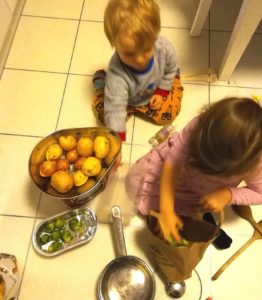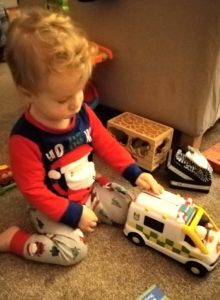The short answer is no.
We’ve recently tried to limit the amount we spend after reading Your Money Or Your Life by Vicki Robin. Although we’ve not officially started her nine steps to financial freedom, we’ve certainly made a start in cutting down our spending. The ethos of the book is that by spending less and investing well you can be financially independent, help the environment and live a happy, more fulfilled life.
This all sounds good to me.
In the run up to Christmas when we’re all at peak consumerism, I started to ask myself this before I bought anything:
‘Do I want to buy this or does consumerism want me to buy this?’
This simple question has meant that I’ve pretty much given up buying new clothes (though I did treat myself to a Joules dress from Oxfam for £6), make-up, ad hoc treats for the kids and anything within a metre radius of any checkout.
I’ve stopped going to cafes and getting takeout as often. Everyone knows most vegan cake tastes awful, yet I was still buying at least one a week as a ‘treat’. Giving up the vegan cake habit alone has saved me about £16 a month.
I’ve made my dinner for work every day for to months as I was buying overpriced sandwiches from nearby hipster cafes at least once a week too. This has saved me another £20 a month.
I still take the kids to cafes – they love the Pausa cafe at Dunelm Mill – but now we only go as a treat and usually with Nana who always insists on paying anyway. Previously I was going whenever I couldn’t be bothered to cook or if I’d run out of ways to entertain them.
Over Christmas, most of our money went on food and drink, often in the pub. I don’t think we are or drank to excess though (apart from New Year’s Eve when I got off my face drinking prosecco with my old friends from school). I did feel guilty about the amount we were spending a couple of times, but considering it was Christmas, I think we did OK. We still recycled, we still avoided plastic as much as we could and we were more mindful about what we bought.
The only real error in trying to have a more eco friendly and less expensive Christmas was reusing our potted Christmas tree from last year. We brought it in the house a week before Christmas Day and by Boxing Day the fly infestation was so bad we had to take it down and remove hundreds of tiny fly corpses from the carpet and window sill.

Joni was profoundly affected by this and on the thank you are she made for my aunty, she drew a Christmas tree covered in flies. Next year, we may have to buy an artificial one.
After reading Your Money or Your Life I’ve come to an understanding that has been in the back of my mind for some time. Companies want us to spend money. They love it when we spend money. When we give them money, we are serving them and under their control. So they go all out to make us want more and more.

Sadly, this obsession with wanting stuff starts young. Joni watches Milkshake on Channel 5 and asks for everything she sees in the adverts, even stuff that she doesn’t know what it is.
It’s no wonder that enough is never enough for people though. After having kids, we started to watch shows like Postman Pat, Fireman Sam and Thomas the Tank Engine again. In the modern versions of thesetshoes all of the charm is gone and replaced with ridiculous storylines to accommodate even more ridiculous vehicles that are now be sold as toys.
Even if consumerism wasn’t the drive behind giving Postman Pat a helicopter and a boat, it shows that the media thinks simply having a van and going on quaint adventures is no longer enough for the kids watching Pat.
Thomas the Tank Engine now goes on adventures around the world, far beyond Sodor, in one episode he dreamed he had wings and could fly – cue the flying Thomas toy.
Why isn’t it enough that Thomas, Pat and Sam can enjoy hanging out with their friends and helping people? The new episodes have zero charm and are beyond irritating.

So what do all these upgrades mean for the environment? The more we buy, the more energy is needed to make stuff, the more packaging is thrown away and the more we expect.
The plan for 2019 is to rely less on stuff, to buy less stuff and throw less stuff away. We want to save money and stop giving it to companies whose main goal is to part us from our money at whatever environmental cost.
In 2019, we’re going to show these companies that we do have a choice and that just because some plastic crap has a picture of Peppa Pig or Thomas on it, it doesn’t mean we’re going to buy it.